|
|
|
Sort Order |
|
|
|
Items / Page
|
|
|
|
|
|
|
| Srl | Item |
| 1 |
ID:
183610
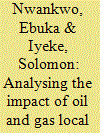

|
|
|
|
|
| Summary/Abstract |
In order to optimise the benefits of oil and gas resources, Local Content Regulations (LCRs) have escalated in the last 15 years among oil-rich economies. In Nigeria, the Nigerian Oil and Gas Industry Content Development Act (NOGICDA) gives the Nigerian Content Development and Monitoring Board (NCDMB) the rights to drive policies and set targets for the growth of Nigerian Content (also known as local content) in the oil and gas industry. Despite the increased in-country engineering capacity observed as result of NOGICDA, the non-disclosure of basic details of contracts in the oil and gas industry creates difficulties in accessing local content contribution to Nigeria's Gross Domestic Product (GDP). Thus, a simple model based on in-country spends is proposed for the estimation of change in GDP as result of increased contracts to Nigerian companies. This proposed model is used to estimate the impact of Shell Companies in Nigeria (SCiN) spend on local contractors since 2010. The study is limited to SCiN since it has consistently published the total value of contract awarded to Nigerian companies since 2010. A yearly contribution of $5.6 billion to Nigeria’ GDP is estimated as a result the contracts awarded to Nigerian companies by SCiN.
|
|
|
|
|
|
|
|
|
|
|
|
|
|
|
|
| 2 |
ID:
141111
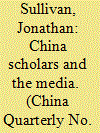

|
|
|
|
|
| Summary/Abstract |
Public interest in China, as reflected in the level of media attention, is burgeoning in the West and elsewhere in the world. This interest is driven by China's increasing presence and importance in the lives of people around the world; and for the same reason is likely to continue growing. Since media discourses are the main way in which Western publics receive information about China, contributing to media reports and helping journalists reach deeper understandings is an important task and opportunity for academics whose specialist knowledge of China is often more nuanced than that of generalist China correspondents. Although developments in the two professions are demanding closer and more frequent interactions, many scholars are reluctant to engage. This is partly due to structural disincentives within the academy, and partly due to obstacles in the scholar–media relationship. Focusing on the latter, the objective of this article is to illuminate how China scholars and journalists currently interact, and to identify means to increasing their efficiency and sustainability.
|
|
|
|
|
|
|
|
|
|
|
|
|
|
|
|
| 3 |
ID:
183031


|
|
|
|
|
| Summary/Abstract |
Many European countries have been the target of jihadist terrorist attacks between 2015 and 2017. While the chance of becoming a victim of a terrorist attack is low, terrorism scholars have emphasized that terrorism does not revolve around statistics and casualty numbers. Terrorists use attacks to reach an audience and affect groups beyond the direct victims. To this date, little is known about how terrorist attacks might affect the salience of terrorism beyond national borders. This paper investigates possible convergence of issue salience of terrorism among citizens within the European Union for ten jihadist attacks in the period 2015–2017 using Eurobarometer survey data. The results indicate that it is not simply a question of convergence or divergence of salience of terrorism after a terrorist attack. The connection is multidirectional and depending upon a variety of factors. Most importantly, we observed convergence on the EU-level, but divergence on the national level. This raises important questions about the transnationality of the effects of terrorism. As this research does not test nor find a causal mechanism and is solely dependent on existing data, further research is necessary to test some of its findings.
|
|
|
|
|
|
|
|
|
|
|
|
|
|
|
|
| 4 |
ID:
155801
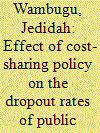

|
|
|
|
|
| Summary/Abstract |
The qualitative case study explores the effect of cost-sharing policy on the dropout rates of students in public secondary schools in the Limuru district, Kenya. Interviews were conducted with students who returned to school after they had raised money for tuition, teachers serving on the school district committee and the head teachers. The cost-sharing policy was viewed as a burden that has increased dropout, repetition and absenteeism in schools. Children from poor backgrounds continue to be marginalised as some national schools charge exorbitant school fees. Based on the findings the study offers some recommendations for policy-makers to consider.
|
|
|
|
|
|
|
|
|
|
|
|
|
|
|
|
| 5 |
ID:
154481


|
|
|
|
|
| Summary/Abstract |
The Democratic Republic of Congo (DRC) is a country with high natural resources, but it has suffered from decades of civil wars and social turmoil, being heavily aid-dependent. In the DRC, several Nonprofit Organisations (NPOs) are major players in fighting poverty and enhancing welfare. This research aims to analyse the effectiveness of small NPOs in improving poor peoples’ lives through health, education, and economic activities. Two NPOs working in the DRC, one in a rural and the other in an urban area, are compared by researching the aid sites and surveying 201 households (aid beneficiaries). Our case observations and the survey results facilitate analysing the mission accomplishment, effectiveness, and accountability of the NPOs although we admit that the DRC conditions make exact measurements difficult. Multivariate analyses are used to study the differences in aid impacts. There are significant differences in the beneficiaries’ perception of the NPO effectiveness in improving health while no significant differences in education impact were found. This is probably because both case NPOs have succeeded in getting a large proportion of the children of their area registered in the education centres created by the NPOs. Differences were observed in the accountability and reporting style of the NPOs.
|
|
|
|
|
|
|
|
|
|
|
|
|
|
|
|
| 6 |
ID:
184997
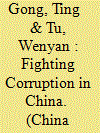

|
|
|
|
|
| Summary/Abstract |
This article provides an overview of the decades-long fight against corruption in China, focusing on its trajectory, dynamics, and impact. Corruption has long been a threat to China’s social stability, its economic development, and even the legitimacy of the regime. Equally notable are the numerous efforts made by successive generations of the Chinese leadership to control and prevent corruption. While goals may have remained the same across different periods, anti-corruption strategies and methods have changed considerably, moving from sporadic campaigns to more institutionalized methods and from power-driven rectification to rule-based integrity management. The current anti-corruption drive, launched after Xi Jinping took power at the 18th National Party Congress in 2012, not only has demonstrated novel features, suggesting a multi-pronged approach, but also is unprecedented in its breadth, depth, and severity. What are the dynamics of China’s fight against corruption? Has the increasingly intense crack-down been able to contain corruption? How can we understand the impact and effectiveness of anti-corruption enforcement in China? The six articles, including this one, in this special issue provide answers to these questions.
|
|
|
|
|
|
|
|
|
|
|
|
|
|
|
|
| 7 |
ID:
186966
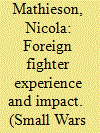

|
|
|
|
|
| Summary/Abstract |
This paper examines the relationship between prior conflict experience and the impact of foreign fighters on armed groups. This paper addresses the findings in existing research that describes foreign fighters as both assets and liabilities by disaggregating foreign fighters into first-conflict foreign fighters and veteran foreign fighters. While prior experience determines the potential impact of foreign fighters, I introduce the concept of foreign fighter integration to understand how this experience is utilized or leveraged by armed groups. The theory-building framework helps explain why we see certain groups leverage foreign fighters in ways that shape their repertoires of violence, tactics, or even ideology, while, in other instances, the influence of foreign fighters appears to be limited – with any consequent effects restricted to the small factions into which foreign fighters have been assigned. Using this theoretical framework of experience and integration, I re-examine in the cases Somalia and Bosnia and Herzegovina to demonstrate how and where foreign fighters impact armed groups.
|
|
|
|
|
|
|
|
|
|
|
|
|
|
|
|
| 8 |
ID:
105772
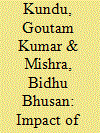

|
|
|
|
|
| Publication |
2011.
|
| Summary/Abstract |
Orissa is the first state in India to have undergone reform in the power sector, with the government withdrawing its control. The model of this reform is known as the WB-Orissa model. The goal of this paper is to examine the impact of this reform on consumers of electricity, which has been measured using multiple regression models. The variables represent the parameters that consumers are most interested in, and the regression coefficients represent the weights of the corresponding variables. The data were collected using a survey methodology. The impact of reform was found to be mixed. Some groups of consumers saw benefits, while others felt a negative impact. A focus group study was conducted to identify the variables of interest to consumers of electricity. The model was used to estimate consumer benefit and was validated using primary data and structural equation modeling. The study revealed beneficial aspects of reform and areas with no benefits.
|
|
|
|
|
|
|
|
|
|
|
|
|
|
|
|
| 9 |
ID:
148384
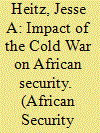

|
|
|
|
|
| Summary/Abstract |
In this commentary, the question to be explored is: what were the consequences of the Cold War for African security? This particular question is complex and multi-faceted and, as a result, this commentary analyses decolonisation, the post-independence situation and the resultant economic and political instability, the occurrence of proxy wars, the overall significance of the Cold War, and the enduring legacy of the Cold War for African security.
|
|
|
|
|
|
|
|
|
|
|
|
|
|
|
|
| 10 |
ID:
140861
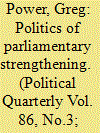

|
|
|
|
|
| Summary/Abstract |
Parliament's International Development Committee made a powerful case this year that DFID should put more money into parliamentary strengthening in developing countries. Arguing that parliaments were central to tackling corruption, improving economic development and building stable political settlements, they recommended that parliaments should be at the ‘heart of DFID's governance work’. The report, though, also touched on wider issues of how DFID commissions and monitors its political programmes, suggesting fundamental changes to both. DFID recognises these challenges, and offered either full or partial agreement with most of the recommendations. The challenge that remains, though, is moving from the rhetoric of ‘engaging with politics’ to a much improved form of political and parliamentary programming.
|
|
|
|
|
|
|
|
|
|
|
|
|
|
|
|
| 11 |
ID:
164642
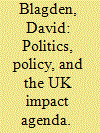

|
|
|
|
|
| Summary/Abstract |
The “Impact Agenda” of the UK Research Excellence Framework has major implications for the relationship of international relations scholars, and social scientists more generally, to government policymaking—not just in Britain, but around the world. This article demonstrates that, at its worst, the Impact Agenda may struggle to capture the true contribution of scholarship to the public good, incentivize sub-optimal forms and modes of research, erode academics’ property rights, see atomized academics exploited or harmed by powerful institutions, and jeopardize scholars’ intellectual integrity and independence. The article also suggests, however, that these vulnerabilities can be managed by the resolution of certain key questions pertaining to scholarly conscience and expectations of reward prior to pursuing “Impact.” Given that the pursuit of international peace and societal progress through teaching and research is the reason many of us choose to become professional international relations scholars, the article concludes with some reflective “tips” for achieving policy influence from early in an academic career.
|
|
|
|
|
|
|
|
|
|
|
|
|
|
|
|
| 12 |
ID:
131092


|
|
|
|
|
| Publication |
2014.
|
| Summary/Abstract |
The drivers of HIV/AIDS in the South African Police Service (SAPS) and impact of the disease on this workforce are neglected areas of research. Existing evidence suggests that while the occupational risk for contracting HIV is low, there are factors associated with the profession that, if left unmanaged, place police officers at risk of contracting HIV. This study's two aims are to identify the potential pathways of HIV infection within policing services and determine the probable impact of HIV/AIDS on SAPS. Through a systematic literature review on HIV/AIDS within police services, and by analysing selected SAPS human resource data, the causal pathways and impact of HIV/AIDS on police services are explored. The study finds that police officers (particularly male officers) are likely to be highly susceptible to HIV infection as a result of risky sexual behaviours born out of occupational characteristics such as high levels of stress, difficult working conditions, living away from home and interactions with sex workers. The problem is exacerbated by the 'macho' culture that often prevails among police officers. HIV/AIDS interventions within SAPS must focus on sustained behaviour change. Further, HIV programmes must equip officers with the knowledge and awareness to avoid engaging in high-risk sexual practices that may compromise their health and the effectiveness of the policing service.
|
|
|
|
|
|
|
|
|
|
|
|
|
|
|
|
| 13 |
ID:
183426


|
|
|
|
|
| Summary/Abstract |
This paper examines the issue of adverse information-psychological impacts on society and effects used on the Internet.
|
|
|
|
|
|
|
|
|
|
|
|
|
|
|
|
| 14 |
ID:
158768
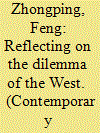

|
|
|
| 15 |
ID:
072626
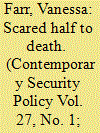

|
|
|
|
|
| Publication |
2006.
|
| Summary/Abstract |
Due to their widespread availability, mobility and ease of use, small arms are a very important factor in the flaring up and perpetration of many expressions of trauma, both in times of war and in degraded 'peacetime' environments characterized by large-scale violence. They have become central to maintaining social dislocation, destabilization, insecurity and crime in the build-up to war, in wartime and in the aftermath of conflict. Small arms are misused within domestic settings as well as in public spaces, and they impact on everyone in the community. One means to counter their effects, therefore, is to increase our understanding of the role played by prolific small arms and light weapons in reinforcing and maintaining genderspecific violence before, during and after conflict.
|
|
|
|
|
|
|
|
|
|
|
|
|
|
|
|
| 16 |
ID:
180569
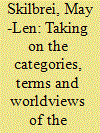

|
|
|
|
|
| Summary/Abstract |
Researchers have many incentives to make sure that the work they do is relevant to policymakers and implementers. First, it may secure them funding; second, ‘impact’ is part and parcel of academic evaluations; and third, researchers are often attracted by the prospect of doing work that matters and that contributes towards social justice. Moreover, the mandate and urge to be relevant are central to governments’ capacity to formulate effective and just policies, but this may also constitute an epistemological challenge by creating blind spots. In this article, I explore key challenges that emerge from the relationship between policy and research. I take as a starting point my own experiences as a migration scholar, who mainly conducts research on migration to Norway and the development and implementation of Norwegian migration policies, and use these to reflect on the consequences of external and internal pressures on research to be relevant and have an impact.
|
|
|
|
|
|
|
|
|
|
|
|
|
|
|
|
| 17 |
ID:
175508
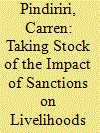

|
|
|
|
|
| Summary/Abstract |
This article draws on the established empirical literature to assess the impact of United States sanctions on livelihoods and poverty in Zimbabwe. Using time-series data spanning from 1980 to 2015, the findings from a linear specification in sanctions duration show no evidence to support the negative impact of sanctions on formal employment and poverty. The results, however, portray a quadratic relationship between sanctions duration and livelihoods. Sanctions reduced formal employment during the initial stages but the negative relationship changed over time. Subsequently, informality increased during the sanctions period. Similarly, the relationship between sanctions duration and poverty is also non-linear. The turning point of the poverty quadratic curve coincides with the implementation of indigenization policy. Indigenization policy magnified sanctions’ negative impact instead of offsetting the impact. In this view, the government should consider addressing the indigenization policy which it has control over while at the same time continue re-engaging USA for the removal of sanctions.
|
|
|
|
|
|
|
|
|
|
|
|
|
|
|
|
|
|
|
|
|